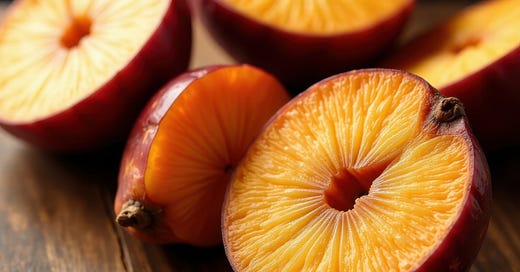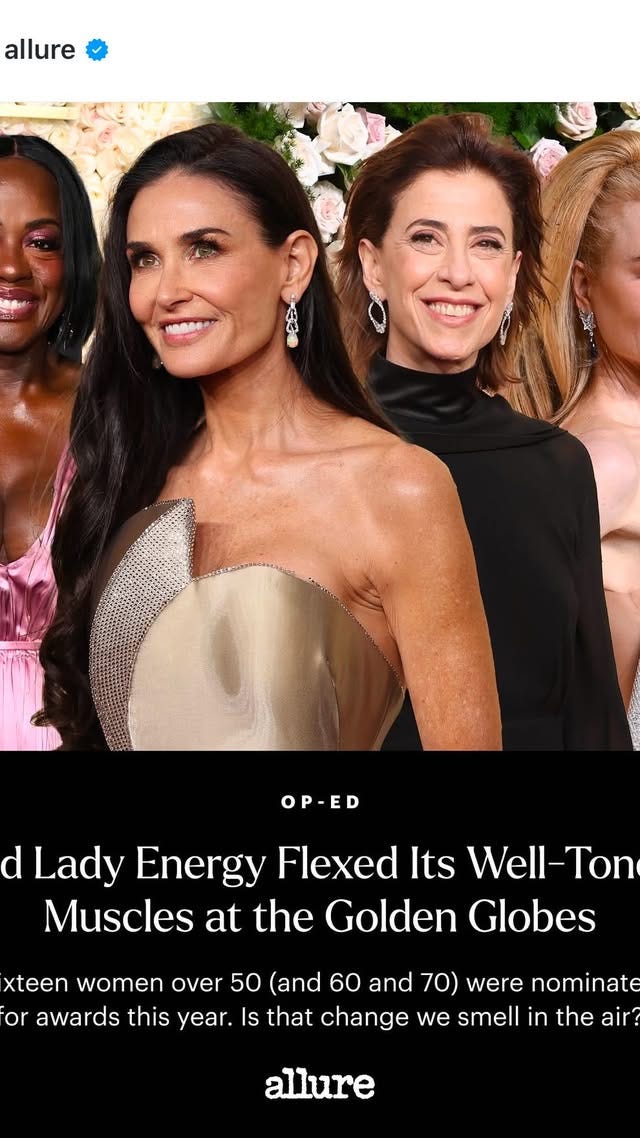Welcome to Age Match: a nuanced take on life when you’re not a girl, yet now a woman — when the hell did that happen? Maybe it’s TikTok’s influence or the fact that a catty comment online has gone from “you’re ugly” to “you’re old”, but I’ve been thinking about the equal benefits, joys, chaos and confusion that comes with becoming wiser and wrinkled.
Let’s go back to January, when I first started this newsletter but abandoned it due to the LA fires: the Golden Globes were rife with accomplished, dominant powerhouses making their mark: Jean Smart, Demi Moore, Nicole Kidman, Cate Blanchett, Kate Winslet, Jodi Foster, Fernanda Torres, Pamela Anderson, etc. A few days later, this
story popped up in my feed:Internally, I became immediately defensive. “OLD?” These women don’t look old. They don’t act old, in a traditional sense. Hell, are they old at all? But then I sat with it — and I read the story itself. (Something not a lot of people do these days.)
The conversation around aging the last decade has centered around acceptance and celebration. Allure, with Helen Mirren on the cover, officially banned use of the word anti-aging. I have written for the magazine about the need for makeup brands to not only acknowledge but centralize their marketing around women 40+, who feel they are invisible to the industry yet have money to burn. An excerpt from that story still conveys how I feel about getting older myself:
But growing older hasn’t eradicated everything that makes me me. I haven’t become a drab robot because I now have a Roth IRA and bills to pay. I still laugh at potty humor. I still sing songs to my dog. Britney Spears remains my idol. My interests have held strong for the past 20 or so years. I’m a Disney Adult, for God’s sake! So why, when I walk into a retailer, do I feel like I’m already aging out?
It’s because brands don’t want to be seen as “old,” and neither do people — unless they already are, and even so, the term clearly illicits defensiveness. Today, you cannot use the word “old” to describe anyone without getting blowback. Mature is now the preferred adjective, at least in the beauty world. But if we’re being frank, it sucks. It’s just as bad as being referred to as “mam” while checking out at the store or being called “lady” on the internet. (Odd since both word are inherently polite.) Hell, I’m nervous to reveal my actual age in this story out of fear it will haunt my career aspirations or potential partnerhips. Which, speaking of, I’m getting more partnership offers from brands for all kinds of anti-aging products, and I’m in my 30s! Which makes me wonder if I appear older than I am, or if they want me to promote preserving youth.
It’s sad and embarrasing that I’m thinking these thoughts. Yet I am.
What is old? Is a concrete age like, say, 80? In 20 years, when I’m in my 50s/60s, will it be 90+? With longevity becoming a focus, will it be being a Centurian? Is it a physical or mental state?
This conversation altogther reminds me of that meme of the Golden Girls and And Just Like That. These shows center around women that are the same demographic but they look drastically different. Because times have changed! And the idea of what aging look like has also changed, too. AJLT is about characters we know and semi-appreciate dating in a new era of their lives. And older era. Are they considered old?
Back to the Old Lady Energy discussion: the more I thought about the use of the term “old,” the more I calmed myself. Because I understand what writer Val Monroe (of
) was doing: reclaiming the word itself. We do not have a word, as women, that makes getting older sound sexy — men get “silver fox.” We get… crone?“Old” means experienced. But also means advanced in age, worn, tiresome; common synonyms include geriatric, elderly… ancient! Jesus Christ. I get why we all viscerally got upset, defensive even, about it being used as the adjective to describe these women, whom are accomplished, hard-working and have a legacy within the entertainment industry. We don’t like it when women are reduced to nothing but their looks, so why should age be any different?
However, that was an important point being made in Monroe’s story. So many women over the age of 50 were up for awards. In an industry where they are typically taken out to pasture, so to speak, having women-lead films and television represented in this way is worth calling out. Especially when women are still fighting to get hearty roles made for them or produced. And especially since we’re still casting women as the mother of women a few years their junior: Jennifer Coolidge, 63, played Jennifer Lopez’s (55) mother in Shotgun Wedding. A new show with with Jessica Biel (43) and Elizabeth Banks (51) has cast Janel Moloney, who is 54, as their mother.
I still think “old” is a difficult term to celebrate, given the connotation it’s had for…ever? And I think it’s everyone’s individual right to decide if they like it or not. Two things can be true at once: you can appreciate the life you have lived and be gracious to get older, but you can still feel let down when being referred to as a word typically associated with being worn out or outdated. But I loved the evolution of this moment from makeup artist Pati Dubroff, who was not happy initially with the sentiment of Monroe’s story.
Dubroff and Monroe are both icons in their own right. I knew Pati likely didn’t realize who wrote the story… then Sam McKnight jumped in! (These are people I’d love to have at a dinner party, by the way. The stories!)
Dubroff has a point that even I am seeing at my age, despite being around two decades younger. Getting old, for whatever reason, has made a person unvital in many regards, especially in the industries we work in. (Beauty, fashion, entertainment.) That’s why Monroe’s terminology struck a cord, but also why it’s important that we’re at least talking about it. Monroe explained her point further in another essay for Allure.
I don’t know if we’re ever going to be able to fully reclaim the “O” word, though. Old, unfortunately, needs banana bread’s publicist. People still cringe at the thought of being labeled as such, even if they appreciate the act of getting old.
So… what do you think? What is “old”?












Aging and "anti-aging" are topics that live forever in my mind. I remember saying to a beauty associate as a ripe 18y/o "I want to take care of my skin now so I can age gracefully". like what in tar nation? Why is that even a thing. Suffice to say, I realllly feel for these sephora kids. Like, collectively, what are we doing?
I report on — and have made a mission of — changing the aging narrative and even at 56, and an enormous fan of Val’s, took pause for just a second about “old lady.” But then I remembered decades ago when I saw “The Vagina Monologues” on stage … the trio of actors sat and said “vagina” dozens of times before starting the show, to desensitize the audience. From twinging (or giggling?) when they said the word throughout. That’s how I feel about this. The more we talk about aging and getting older, the more we stop hearing it as harsh and just as a fact. We are getting older. And with it f’ing brilliantly wiser, smarter, more charming, more interesting, far more compassionate and less fearful of risks.